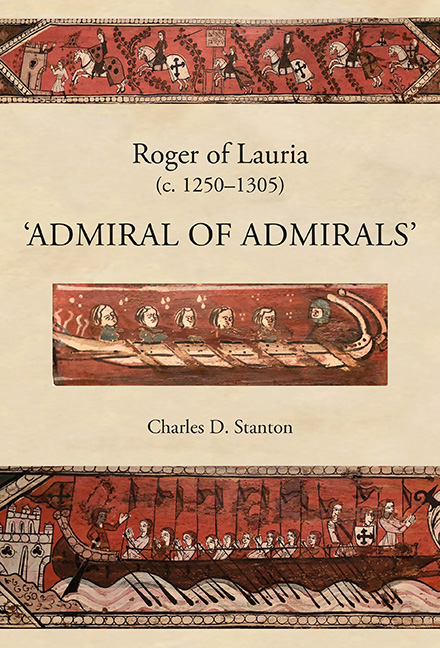Book contents
- Frontmatter
- Dedication
- Contents
- List of Illustrations
- Prologue
- 1 Battle of Benevento (26 February 1266)
- 2 A Calabrian Exile in the Court of Aragon (1262–1282)
- 3 Battle of Tagliacozzo (23 August 1268)
- 4 Aragonese Expansion (1229–1282)
- 5 Angevin Consolidation and Aggrandizement (1268–1282)
- 6 Revolt of the Vespers (30 March 1282)
- 7 Aragonese Intervention (August–October 1282)
- 8 Stalemate (November 1282–March 1283)
- 9 Admiral of Aragon (20 April 1283)
- 10 The Opposing Fleets (1282–1302)
- 11 Battle of Malta (8 June 1283)
- 12 Anjou's Dreams of Empire Dashed (June–November 1284)
- 13 France's Crusade Against Aragon (May–November 1285)
- 14 Battle of the Counts (23 June 1287)
- 15 Truces and Treaties (June 1287–November 1291)
- 16 Raid on Romania (Summer 1292)
- 17 Switching Sides (December 1293–April 1297)
- 18 Aragon's Invasion of Sicily at Anjou's Bidding (1298/1299)
- 19 Lauria's Last Great Campaign (Summer 1299–Spring 1300)
- 20 Endgame (Spring 1301–Summer 1302)
- Epilogue
- Bibliography
- Index
2 - A Calabrian Exile in the Court of Aragon (1262–1282)
Published online by Cambridge University Press: 24 October 2019
- Frontmatter
- Dedication
- Contents
- List of Illustrations
- Prologue
- 1 Battle of Benevento (26 February 1266)
- 2 A Calabrian Exile in the Court of Aragon (1262–1282)
- 3 Battle of Tagliacozzo (23 August 1268)
- 4 Aragonese Expansion (1229–1282)
- 5 Angevin Consolidation and Aggrandizement (1268–1282)
- 6 Revolt of the Vespers (30 March 1282)
- 7 Aragonese Intervention (August–October 1282)
- 8 Stalemate (November 1282–March 1283)
- 9 Admiral of Aragon (20 April 1283)
- 10 The Opposing Fleets (1282–1302)
- 11 Battle of Malta (8 June 1283)
- 12 Anjou's Dreams of Empire Dashed (June–November 1284)
- 13 France's Crusade Against Aragon (May–November 1285)
- 14 Battle of the Counts (23 June 1287)
- 15 Truces and Treaties (June 1287–November 1291)
- 16 Raid on Romania (Summer 1292)
- 17 Switching Sides (December 1293–April 1297)
- 18 Aragon's Invasion of Sicily at Anjou's Bidding (1298/1299)
- 19 Lauria's Last Great Campaign (Summer 1299–Spring 1300)
- 20 Endgame (Spring 1301–Summer 1302)
- Epilogue
- Bibliography
- Index
Summary
ACCORDING TO A TRADITION dutifully passed on by some modern scholars, Richard of Lauria (Roger's father) would have been at King Manfred's side in the final moments of his life as the devoted retainer. He would have fought beside the king until the desperate end at that bridgehead by the River Calore near Benevento, and would have actually held his mortally wounded lord in his arms as he breathed his last breath. Richard, himself, would then have been run through from behind by Jeronimo di Sambiase, a Guelph knight who had broken through the last cordon of the king's bodyguard.
The trouble is that there is no contemporary corroboration for such an account. Truth be told, Roger's origins are clouded at best, especially concerning his father. The only specifics that seem certain are that his father was a faithful feudatory of the Hohenstaufen monarch and that he likely died at Benevento with most all of Manfred's other knights. Not even his name is known with absolute confidence. Ramon Muntaner's chronicle, one of the very few contemporary sources to address the issue at all, says only that Roger ‘was of noble descent, from banner lords’, intimating that his father was a ‘knight banneret’ – a low-level baron who commanded a company of knights under his own banner. It later substantiates that somewhat by stating that ‘his barony was in Calabria, and consisted of twenty-four castles in one district and the principal castle is called Loria’. The notion that Roger's father was killed at the Battle of Benevento actually stems from a much later source, the sixteenth- century Anales de la Corona de Aragon of Jerónimo Zurita, which also fails to provide a name. Zurita only identified him as a ‘gran privado’ of King Manfred, implying he was a familiaris regis (‘an intimate of the king’), that is, a member of the royal household. Although Zurita's account was not concurrent with the events, it cannot be disregarded entirely. He may have had access to sources no longer extant. In the course of the thirty years that it took him to compose the Anales, Zurita was known to have travelled to Rome, Sicily and Naples, looking for relevant documents beyond the archives of the Crown of Aragon.
- Type
- Chapter
- Information
- Roger of Lauria (c.1250–1305)‘Admiral of Admirals’, pp. 25 - 35Publisher: Boydell & BrewerPrint publication year: 2019

